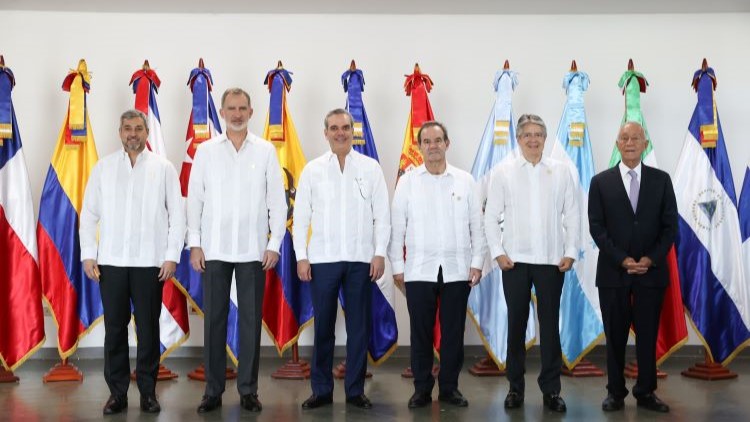Eduardo González
King Felipe VI closed yesterday the XIV Ibero-American Business Meeting, which was held in the Dominican Republic within the framework of the XXVIII Ibero-American Summit of Heads of State and Government and in which he highlighted the interest of the Spanish Presidency in “strengthening economic ties” between the EU and Ibero-America because this “bi-regional relationship is essential for the achievement of the long-desired European strategic autonomy and to strengthen economic growth and social development in Latin America”.
During the meeting, authorities, businessmen and representatives of Ibero-American institutions and business organizations addressed issues such as business innovation, sustainability, climate action, social commitment, new financing models, economic prospects for Ibero-America, gender equality as a transforming engine of the new transitions, infrastructure, energy and ecological transition, connectivity and digital transformation as a basis for productive and sustainable innovation and tourism in the region as a great lever for recovery.
Likewise, the president of the Institute of Economic Studies (think tank of the CEOE), Íñigo Fernández de Mesa, presented the report Business commitment to investment: the role of business in the current Ibero-American situation, which includes contributions from the presidents of the business organizations of the Council of Ibero-American Businessmen (CEIB) and which highlights the need to increase investment in the region in order to position itself as a focus of attraction for financial markets and companies on a national and international scale.
According to the report (presented in a panel focused on investment in Ibero-America and in which participated, among others, the Minister of Industry and Commerce of the Dominican Republic, Ito Bisonó), the attraction of investment requires a favorable business climate and close collaboration with the public sector, in addition to a stable legal and institutional framework, the promotion of key growth factors, such as human capital and infrastructure, and perseverance in macroeconomic stability.
Ibero-American Commitment to Investment
Likewise, during the Business Meeting, an Ibero-American Commitment to Investment Manifesto was adopted, which states that “for Ibero-America to achieve true sustainable development, it is essential to promote economic growth, and private investment plays a fundamental role in this regard”.
Therefore, in order to “recover the attractiveness of our region as a destination for global investment, which has declined by 7% in the last ten years in terms of foreign direct investment (FDI),” it is necessary to “fight for free enterprise and economic freedom, two fundamental factors to boost the economic development of our region,” it continues. The signatories also call for “adequate and stable regulatory frameworks that harmoniously facilitate the legitimate aspirations and desires of the different interest groups in our societies, avoiding absences or excesses.” “The public sector is a key ally and actor to promote and stimulate investment, based on public policies with a long-term vision and development programs that generate favorable environments,” the text continues. Therefore, it adds, “public-private collaboration is an efficient strategy to achieve development, providing immediate answers to urgent problems and viable solutions to major challenges”.
The manifesto was delivered to the Heads of State and Government participating in the Summit during the closing session of the XIV Ibero-American Business Meeting, in which the President of the Dominican Republic, Luis Abinader; the President of Ecuador, Guillermo Alberto Santiago Lasso; the President of Paraguay, Mario Abdo Benítez; and the President of the Republic of Portugal, Marcelo Rebelo de Sousa, took part, moderated by the Ibero-American Secretary General (SEGIB), Andrés Allamand.
Likewise, within the framework of the conversation, the transfer of the CEIB presidency from the Dominican Republic Employers’ Confederation to the National Federation of Chambers of Industries of Ecuador was made official. CEIB, created in 2015, is formed by the business organizations of Argentina, Bolivia, Brazil, Chile, Colombia, Costa Rica, Ecuador, El Salvador, Paraguay, Peru, Mexico, Nicaragua, Panama, Andorra, Honduras, Uruguay, Guatemala, Dominican Republic, Venezuela, Spain (CEOE) and Portugal. The pro tempore presidency of CEIB rotates among the presidents of the business organizations and corresponds to the leadership of the host country of the Ibero-American Summit of Heads of State and Government.
The King underscores the Ibero-American commitment of the Spanish Presidency
The meeting was closed by the President of the Dominican Republic, Luis Abinader, who said that Ibero-America is one of the main markets in the world and is gaining more and more weight, but now it is a question of continuing to grow to become “an area of cooperation, justice, freedom of enterprise and rights”; and by Felipe VI, who was accompanied by the Minister of Foreign Affairs, José Manuel Albares, and the Secretary of State for Ibero-America, the Caribbean and Spanish in the World, Juan Fernández Trigo.
During his closing speech, the King said that, “in view of the Spanish presidency of the Council of the European Union in the second half of the year, Spain is working hard to ensure that the Ibero-American region plays a fundamental role”. “Both regions can and must increase their economic ties, both trade and investment, in order to address the challenges in a more effective and efficient way,” he said. “The two are presented as the areas with the greatest economic complementarity and growth potential” and, therefore, “the bi-regional relationship is essential for the achievement of the long-awaited European strategic autonomy and to strengthen economic growth and social development in Latin America.”
The King also highlighted that “in July, in Brussels, the EU-CELAC Summit will be held, at which a portfolio of strategic investment projects for the region will be presented, which will be supported by the European Union and its Member States, as well as by International Financial Institutions with a regional presence, such as the EBRD, the IDB, the CAF and the CABEI, among others”.







